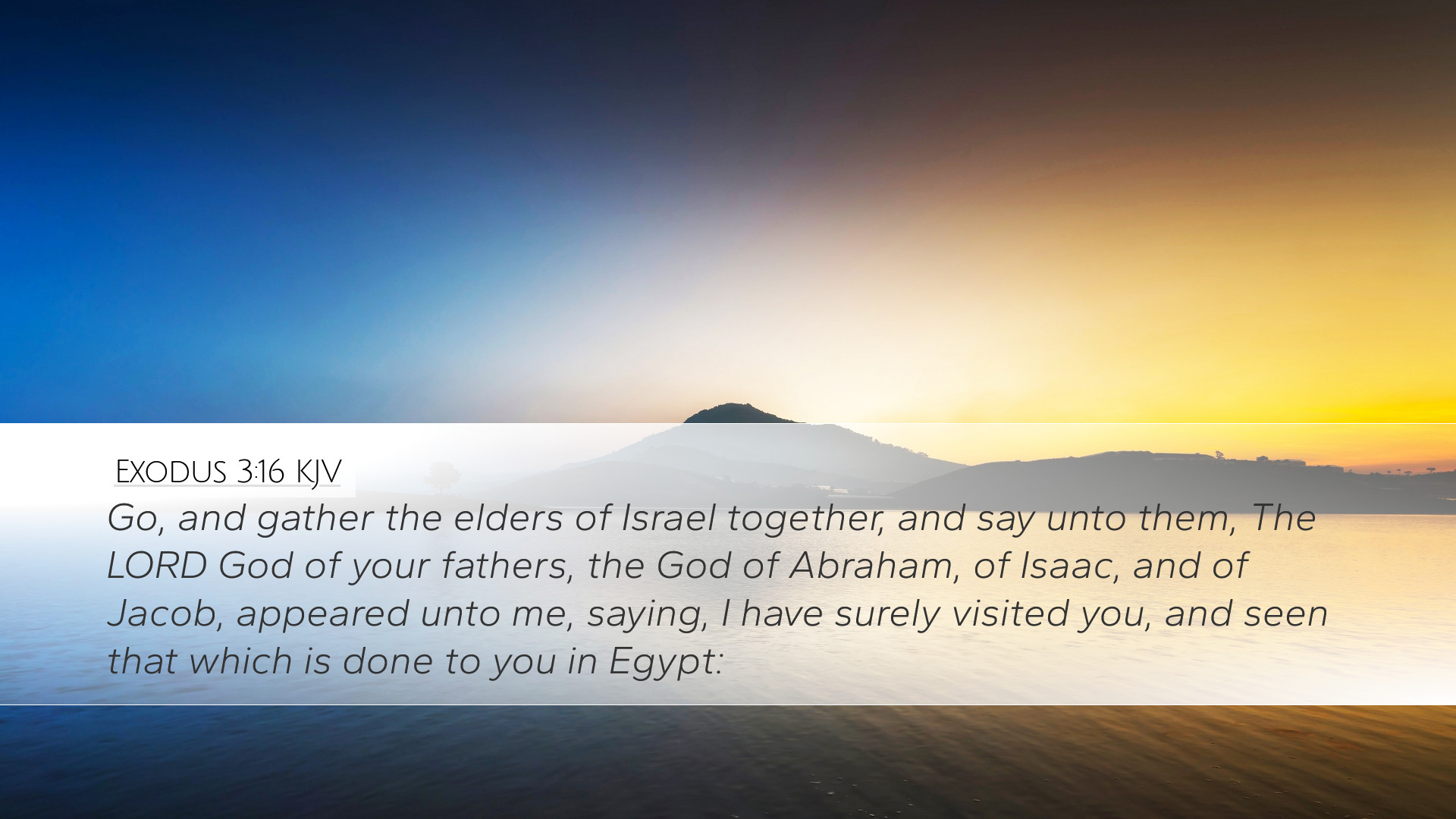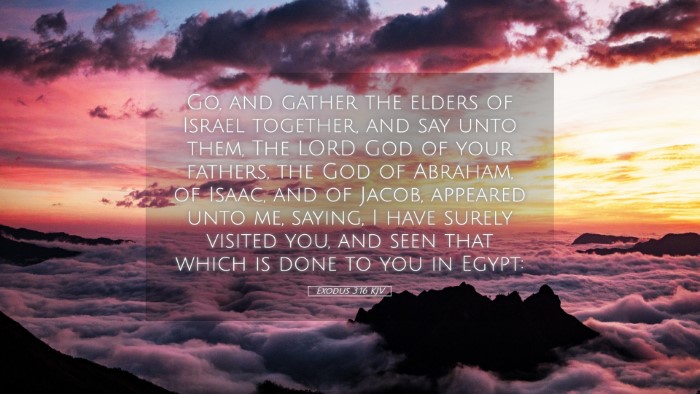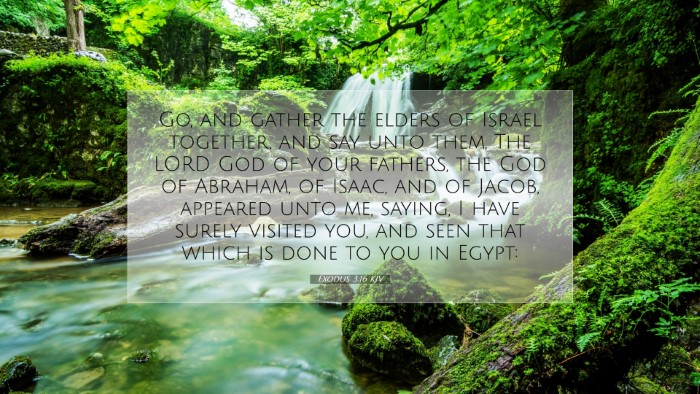Exodus 3:16 - A Study of God's Calling and Assurance
Verse Text: "Go, gather the elders of Israel together, and say unto them, The LORD God of your fathers, the God of Abraham, of Isaac, and of Jacob, appeared unto me, saying, I have surely visited you, and seen that which is done to you in Egypt."
Introduction
In Exodus 3:16, we witness God's directive to Moses, encapsulating elements of divine encounter, historical remembrance, and the promise of deliverance. This verse serves as a bridge that connects the past covenant of God with His people and the present mission of Moses, showcasing God's unwavering faithfulness to His promises.
Commentary Insights
1. Divine Commission
Matthew Henry emphasizes the significance of God's call upon Moses. Moses is instructed to gather the elders of Israel, a collective leadership that implies divine authority and community involvement. This gathering signifies an engagement in God's redemptive plan where He chooses to use human agency for His purposes.
Albert Barnes provides insight into the importance of communal decision-making in the Israelites' journey. The elders represent the established leadership of the Israelites, indicating that God's plan is not merely individualistic but involves the entire community in their deliverance from oppression.
2. Assurance of God's Presence
The phrase "The LORD God of your fathers" connects the present revelation with historical faithfulness. Adam Clarke points out that Moses is reminded of the covenantal relationship God shares with Abraham, Isaac, and Jacob, highlighting that the God who appeared to the patriarchs is the same God who is now active in their midst.
Matthew Henry further notes that this intimate connection reassures the Elders that they are not forgotten. The Lord's visit, signified by His appearance to Moses, conveys a promise of deliverance rooted in God's desire to fulfill His covenant.
3. Theological Implications
This verse speaks volumes about God's method of revelation. God does not operate in isolation; He encompasses human complexity by delegating His mission. Albert Barnes observes that this method not only validates Moses as a chosen leader but also emphasizes God's continuous engagement with His people throughout history. The divine command to gather the elders also reflects a anticipation of collective faith, revealing that community plays a vital role in divine deliverance.
4. God's Promises Amidst Suffering
The declaration, "I have surely visited you," bears the weight of God's awareness and intervention in the suffering of Israel. According to Adam Clarke, God's visitation implies a profound recognition of their affliction and a decisive action toward deliverance. It reassures the Israelites that God sees their suffering and is committed to bringing about His salvation.
Matthew Henry reinforces this theme by describing God's visit as not merely an acknowledgment of their plight but a pledge of liberation. In the context of pastoral care, this insight serves as an encouragement for those in ministry, affirming that God is ever-present in moments of despair.
5. Historical Context and Cultural Relevance
To fully comprehend the implications of Exodus 3:16, one must consider the ancient Near Eastern backdrop in which this event occurs. The culture of collective memory was significant, and invoking the names of the patriarchs like Abraham, Isaac, and Jacob served to remind the Israelites of their rich heritage. Albert Barnes points out that for a people overwhelmed by oppression, recalling their foundational narratives was profoundly affirming.
Matthew Henry states that this connection to past patriarchs not only instills hope but also reestablishes their identity as God's chosen people. This acknowledgment deepens their understanding of God's character as covenant-keeping, immense in mercy, and capable of delivering them from bondage.
Practical Applications
The messages contained in Exodus 3:16 extend beyond its historical context into contemporary faith communities. For pastors, students, and theologians, this verse offers several key insights:
- The Value of Community: Like the elders in Israel, church leaders today must recognize the role of community in discerning and responding to God's call.
- Faithfulness to God's History: Understanding God’s past faithfulness is crucial for building trust in His future actions. This drives both individual and communal faith as shared testimony strengthens resolve.
- Awareness of Suffering: Church leaders are reminded that attentive pastoral care entails recognizing congregational suffering and responding with hope rooted in God's promises.
- Engaging with God's Mission: The directive to gather mirrors the call for evangelism and community outreach today, acknowledging that God calls His people to come together to fulfill His purposes.
Conclusion
Exodus 3:16 serves as a powerful reminder of God's enduring relationship with His people, marked by His call, commitment, and care. Drawing on insights from historical commentaries enriches our understanding and appreciation of God's work, enabling contemporary readers to apply these truths in their lives and ministries. As we reflect on this verse, may we, like Moses and the elders of Israel, be responsive to God's invitations and mindful of His active presence in our pursuits of faith.


